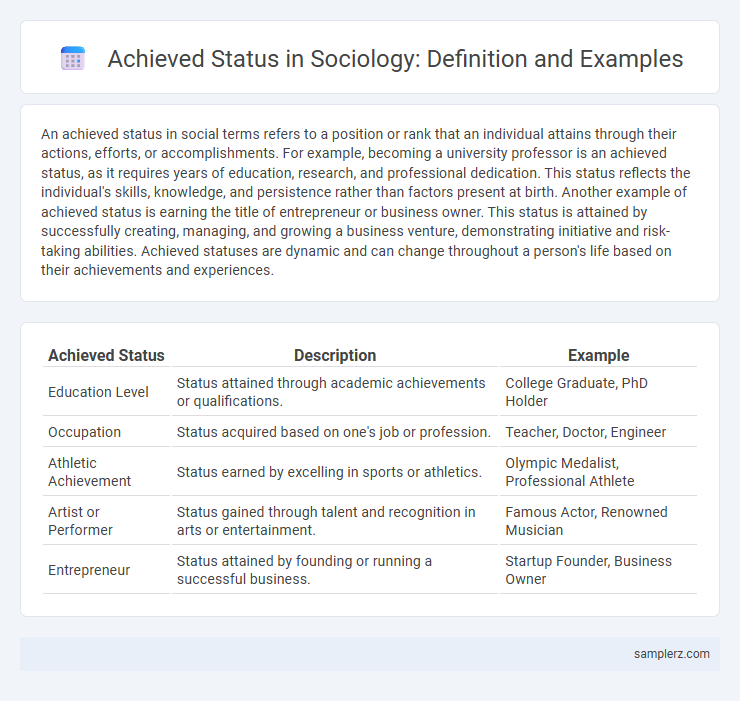An achieved status in social terms refers to a position or rank that an individual attains through their actions, efforts, or accomplishments. For example, becoming a university professor is an achieved status, as it requires years of education, research, and professional dedication. This status reflects the individual's skills, knowledge, and persistence rather than factors present at birth. Another example of achieved status is earning the title of entrepreneur or business owner. This status is attained by successfully creating, managing, and growing a business venture, demonstrating initiative and risk-taking abilities. Achieved statuses are dynamic and can change throughout a person's life based on their achievements and experiences.
Table of Comparison
| Achieved Status | Description | Example |
|---|---|---|
| Education Level | Status attained through academic achievements or qualifications. | College Graduate, PhD Holder |
| Occupation | Status acquired based on one's job or profession. | Teacher, Doctor, Engineer |
| Athletic Achievement | Status earned by excelling in sports or athletics. | Olympic Medalist, Professional Athlete |
| Artist or Performer | Status gained through talent and recognition in arts or entertainment. | Famous Actor, Renowned Musician |
| Entrepreneur | Status attained by founding or running a successful business. | Startup Founder, Business Owner |
Understanding Achieved Status in Social Contexts
Achieved status in social contexts refers to positions individuals attain through their own efforts, skills, or accomplishments, such as becoming a doctor, athlete, or entrepreneur. This status contrasts with ascribed status, which is assigned at birth, like race or family background. Understanding achieved status highlights the role of personal agency and social mobility in shaping an individual's social identity and opportunities.
Educational Attainment: A Classic Achieved Status
Educational attainment serves as a prime example of achieved status in society, reflecting an individual's effort and dedication to learning rather than inherited traits. Degrees and certifications earned from recognized institutions symbolize personal achievement and often influence social mobility and career opportunities. This status highlights the role of merit and accomplishment in shaping one's social identity.
Occupational Roles as Examples of Achieved Status
Achieved status in social contexts is often exemplified through occupational roles such as doctors, lawyers, and teachers, where individuals attain these positions through education, skills, and efforts. These roles reflect personal accomplishment rather than birthright, showcasing merit-based social mobility. Occupational status influences social identity and societal recognition, emphasizing the value of achievement over ascribed characteristics.
Social Mobility Through Achieved Status
Achieved status exemplifies social mobility by allowing individuals to ascend the social hierarchy based on personal accomplishments such as education, career success, or skill development. For instance, a person born into a low-income family who attains a professional degree and secures a high-paying job demonstrates upward social mobility through achieved status. This process highlights the dynamic nature of social stratification, where effort and merit can redefine one's social position.
Marriage and Relationships: Achieved Social Positions
Marriage is a prime example of achieved status in social contexts, where individuals gain a new social identity through their choice to enter a relationship. This status often comes with associated roles, responsibilities, and societal expectations distinct from ascribed statuses like family background or ethnicity. Through marriage, individuals actively shape their social standing and network within their community.
Leadership and Authority as Achieved Status
Leadership and authority exemplify achieved status through roles earned by individual merit, such as elected political positions or managerial roles in organizations. These statuses are often attained by demonstrating expertise, decision-making skills, and the ability to influence others, distinguishing them from ascribed statuses like race or gender. Achieved status in leadership grants social recognition and power based on accomplishments and competencies.
Entrepreneurship: Building Status from Scratch
Entrepreneurship exemplifies achieved status by enabling individuals to build their social standing through innovation, risk-taking, and business success. Founders of startups gain recognition and influence by creating value and jobs, distinguishing themselves from ascribed social identities. This dynamic process highlights how personal effort and achievements shape social hierarchy and reputation.
Community Recognition and Social Achievements
Achieved status in social contexts often stems from community recognition, where individuals earn respect and influence through their contributions or accomplishments. Social achievements such as volunteering, leadership roles in local organizations, and notable successes in cultural or athletic events exemplify this social mobility. These statuses reflect personal effort rather than inherited position, emphasizing merit and active participation within a community.
Sports and Athletic Achievements in Society
Athletic achievements like winning Olympic medals or setting world records exemplify achieved status, showcasing individual dedication and skill within society. These accomplishments elevate athletes' social standing, transcending background or birthright. Society often celebrates such success through endorsements, media coverage, and social influence, reinforcing the significance of earned recognition in sports.
Artistic and Cultural Achievements as Social Status
Artistic and cultural achievements serve as prominent examples of achieved status in social contexts, where individuals gain recognition through talents like painting, music, or performance arts. For instance, acclaimed musicians or celebrated authors attain elevated social standing by contributing innovative works that resonate culturally and historically. These achievements not only reflect personal skill but also influence societal values, enhancing the individual's prestige within various social circles.

example of achieved status in social Infographic
 samplerz.com
samplerz.com